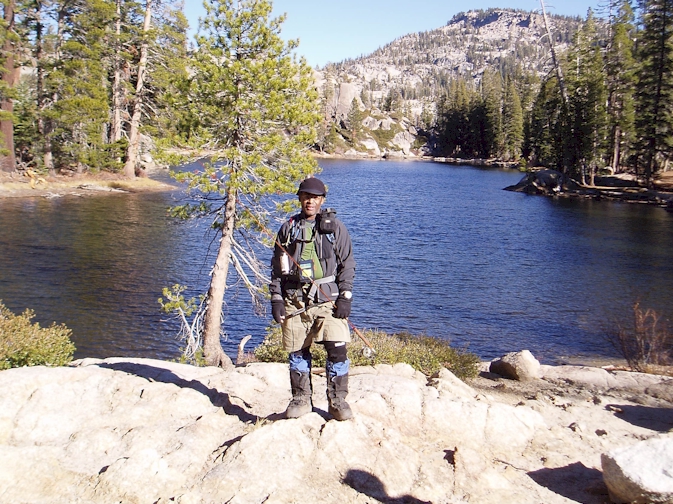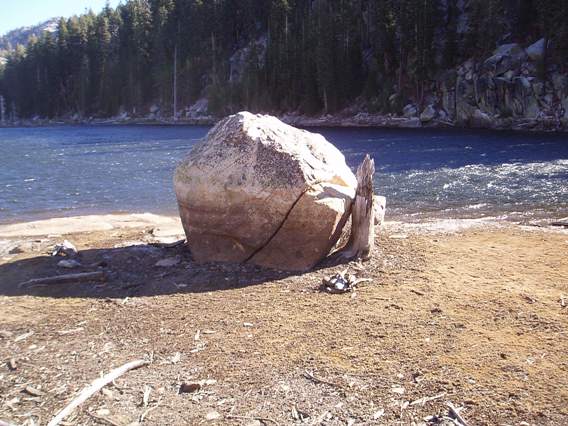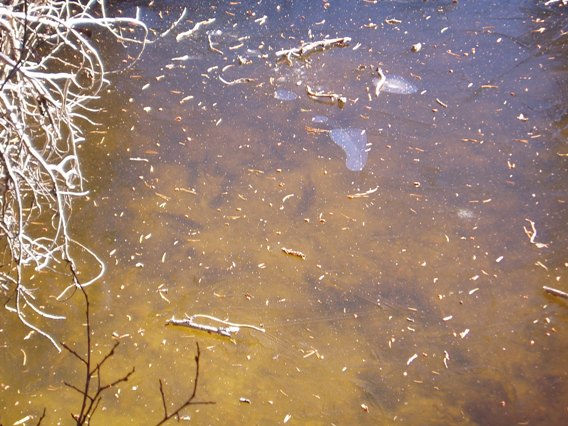|
|
|
|
|
Time:9:00 am- 4:00pm
Method: Slow figure of 8 retrieve, the washing line. I can think of no better way to rid oneself of the sloth brought on by a hardy Thanksgiving dinner then a 7 mile hike in the high country. The last three years my scheduled trip to Camp and Bear Lakes has been weigh laid by snow in late spring/ early summer. It is Karma then that the lack of late fall snow allows me to visit my favorite Sierra lake. I arrive at the trailhead at mid morning. The temps at the trailhead are 41 degrees and a mid morning start allows the lake to warm up a little before I arrive. I am alone. Mine is the soul car at the trailhead. Sierra weather can be fickle and more than usual I’ve made sure that I am prepared to spend a cold night in the Sierra.
Typically on these high sierra day hikes I carry a headlamp, water filter, snake bit kit, water, a rain shell, a Chris Reeve Mountaineer II knife and bear spray. Chris Reeve knives are well known for their quality and hollow handles. The hollow handle allows one to stash a few survival items. In my case, a condom (for carrying water), matches, a few fishing flies, a leader and some pain medication. In a normal situation, these supplies should allow me to fetch and filter water, start a fire, catch fish for food and build a shelter. If I get separated from my pack, I can still survive. If I’m separated from my knife, I’m in trouble. In addition to these items, for winter I carry a synthetic fill puff ball type jacket, pile pants, a wool cap and gloves, emergency blanket which reflects 90% body heat and a lighter. The emergency blanket will stay in the pack and become part of my normal day hiking kit. The hike to Camp Lake takes 1 hour. I love this lake and feel quite at home here. Sadly, it’s devoid of fish. I snap a few photos of the lake in it’s low pre-winter state and continue up the trail to Bear Lake. Bear has an outlet creek that usually holds fish and I was eager to see if that would be the case today. It was. The stream held fish in the form of troutsicles. A ½ inch layer of ice covers the stream. The trout mill about underneath and all things considered, they seem pretty active. At the lake, conditions aren’t promising. The wind is howling, casting is difficult and the wind chill unpleasant. The lake is easily 5 feet lower than I have seen it in the past. The outlet portion of the lake is usually a consistent producer. There’s a five or six feet deep flat that runs from the dam at the outlet, along the bank, to a drop about 15 feet out. There’s some structure, most notably a large rock just off shore. The fish usually cruise the flat and use the rock for cover. This is were I expected to fish but nature had other ideas. There is no water.
I hop off the bank and land with a loud crunch. Crunch, crunch, crunch goes the crystallized mud as I walk out onto the flat. At the drop off I begin my cast. I wiggle about 20 feet of line out of the rod guides and flick the line up behind me. The wind catches the line- instant back cast. I haul on the forward cast and throw a tight loop into the wind. On the next backcast I extend more line and repeat until I have about 40 feet of line shooting into the wind. I keep the line tight as it drifts toward me. There’s no reason to retrieve the line. I cast into and parallel to the wind, fishing what I believe the brits call the “washing line”, simply letting the fly swing back to shore on no retrieve. The white capped waves move the fly pretty quickly. I make the best of the situation and enjoy every minute. The structural knowledge I acquire today will pay dividends when I visit again in June 2008. I don’t fish around the lake as I might normally. The wind chills me to the bone. I’m standing in the sun but the rest of the lake is in shadow and with the wind chill would be much too cold to tolerate. Even so, I stay for a little over an hour before heading back down to Camp Lake. At Camp I run into two fellows with plans to fish and camp at Bear Lake. They have spinning gear and might do well getting their lures deep. It's easily 10 or 15 degrees warmer back at Camp Lake and with very little wind. Warm enough that I remove my jacket. In their shorts pants and sleeves, the backpackers are unprepared for what awaits them. I fish the outlet of Camp Lake- a productive spot in it’s heyday but I don’t expect to catch anything today. The lake no longer holds fish but I always hope to be surprised. On my way out, I convince a passerby to snap a picture of me. I have several pictures of myself in different stages of my life at Camp and it seems fitting that my winter sierra day hike picture is taken here. On the trail I treat the flora and fauna to my version of "Blue Tail Fly" also known as “Jim or Jimmy Crack Corn”. It's an old slavery song of which there are many versions. This is mine and I exclude the very un-P.C. second verse. “When I was young I used
to wait," Chorus: “Jim Crack Cork and I
don’t care”
“And when he ride in the
afternoon” Chorus "One day he ride around
the farm," Chorus "The pony jumped, he
bucked, he pitched," Chorus "They buried him under a
cinnamon tree," Chorus "Old master’s dead now
let him rest," Chorus
Previous Emigrant Wilderness Chronicle Next Emigrant Wilderness Chronicle
|



